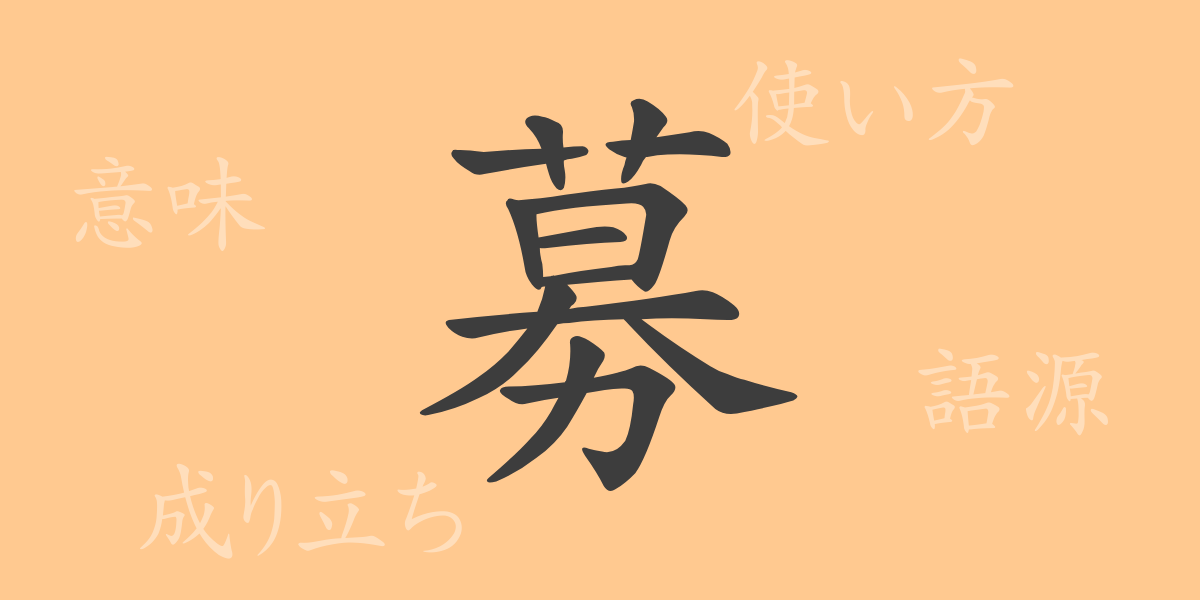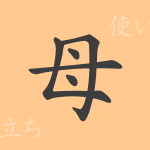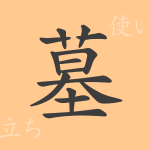The meaning embedded in a single kanji character is deeply understood through its form and history. “募 (bo)” is one of the commonly used kanji in Japan, frequently seen in various aspects of daily life. In this article, we will delve into the origin, meaning, usage, readings, stroke count, and radical of “募 (bo).” Additionally, we will touch upon idiomatic expressions, sayings, and proverbs that use “募 (bo).” Let’s explore the world of the kanji “募 (bo)” while appreciating the depth of the Japanese language.
Origin of 募 (bo)
To explore the origin of the kanji “募 (bo),” it is essential to focus on its etymology. “募 (bo)” is a character that originated from ancient China. Its form combines the radical for “military” (軍) which signifies a gathering of troops, with “力 (chikara)” which indicates action or effort. This combination symbolizes the power to gather many people, essentially the power to “recruit.” Over time, this kanji came to be used in words meaning to collect or solicit.
Meaning and Usage of 募 (bo)
“募 (bo)” primarily means “to collect” or “to widely seek.” It is often used in contexts such as fundraising (募金, bokin), recruitment (募集, boshuu), and applications (応募, oubo). Additionally, it can express heightened emotions, as seen in the phrase “思い募る (omoitsunoru),” which means feelings growing stronger. The contexts in which this kanji is used are very broad, ranging from public announcements to personal emotions.
Readings, Stroke Count, and Radical of 募 (bo)
Understanding the readings and components of the kanji “募 (bo)” can lead to a deeper comprehension.
- Readings: The on’yomi (音読み, Chinese reading) is “ボ (bo),” and the kun’yomi (訓読み, Japanese reading) is “つのる (tsunoru).”
- Stroke Count: “募 (bo)” has a total of 12 strokes.
- Radical: The radical is “力 (chikara),” which represents action or effort and is a crucial element in the meaning.
Idiomatic Expressions, Sayings, and Proverbs Using 募 (bo)
There are numerous idiomatic expressions, sayings, and proverbs in Japanese that include “募 (bo).” Here are a few examples:
- 募金 (ぼきん, bokin): To widely collect donations.
- 募集 (ぼしゅう, boshuu): To widely seek necessary things or people.
- 応募 (おうぼ, oubo): To apply in response to a recruitment.
- 思い募る (おもいつのる, omoitsunoru): Emotions growing stronger.
- 募る (つのる, tsunoru): To gather people or things, or for emotions to grow stronger.
These expressions are closely related to Japanese life and culture, serving as important elements to enrich communication.
Summary of 募 (bo)
The kanji “募 (bo)” symbolizes the power to gather many people or things, as derived from its form and etymology. Its usage in Japanese is extremely varied, from public applications like fundraising and recruitment to personal expressions like “思い募る (omoitsunoru).” Additionally, idiomatic expressions and sayings that include “募 (bo)” highlight the richness of the Japanese language. Through this article, you should have gained an understanding of the meaning, usage, and cultural background of “募 (bo).”
“`

























